Jobsite
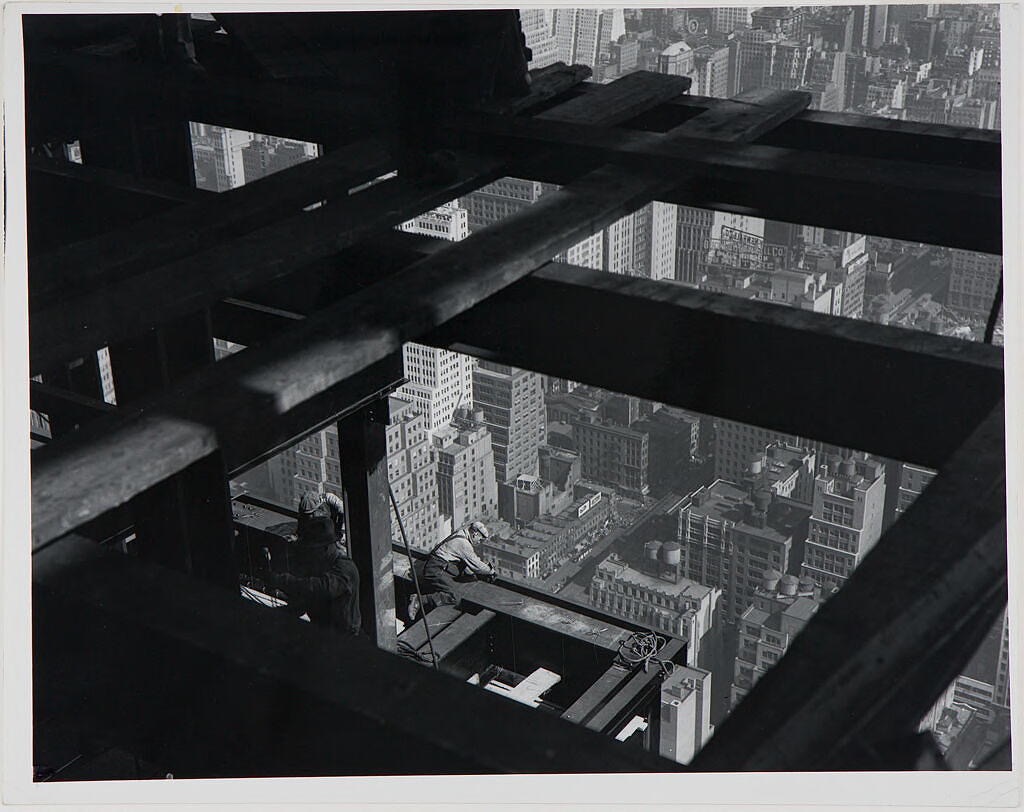
Lewis Wickes Hine: Construction--Empire State Building, (1930-1931, printed later)
" … we will sorely miss this sacred inconvenience."
A home becomes a jobsite quickly, without very much fanfare. One minute, I was breakfasting on my front porch, and the next, or at most the moment after, that porch was being roughly disassembled. I double-locked the front door to prevent anyone, me included, from inadvertently stepping out into air improved only by naked joists. The idea that such a thing could happen haunted me every time I passed by that door through the first weeks. The view out the bottom-of-the-stairs window became a peek into the progress of the deconstruction and the following rebuilding. I stepped around construction materials to set sprinklers and tried to remember to move the vehicles before the work crew blocked the driveway every morning. The whole rhythm of my life changed.
A work crew seems the rough equivalent of a haunting.
Weekly Writing Summary For The Week Ending 8/29/2024
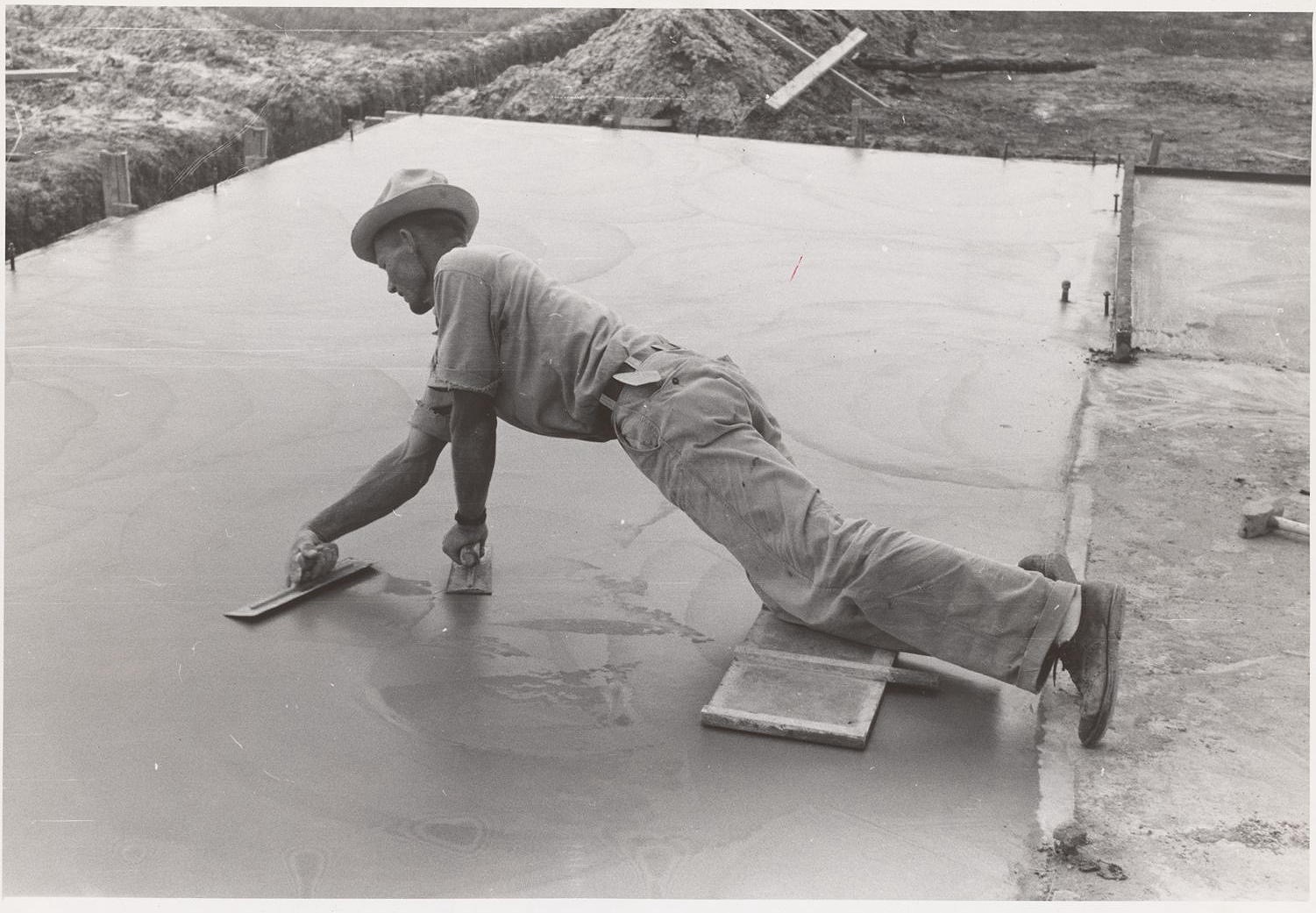
Russell Lee:
Smoothing concrete floor at migrant camp
under construction at Sinton, Texas (1939)
United States. Farm Security Administration
Pride As Well As Purpose
This writing week might have served as a reminder of the necessity of deliberately choosing the terms and conditions I'm pursuing. I can default to a mindset believing I'm somehow destined to succeed, but neither success nor failure usually operates so inadvertently. Deliberate choice might not guarantee a damned thing in this world other than clarity of purpose, though satisfying purpose cannot usually be guaranteed. Clarity helps identify failures more often than it ever guarantees success, and while clarity of purpose might best guarantee disappointment, that clarity remains important. For instance, a fresh choice can feel renewing when overrunning original purpose, even in the light of certain impending failure. One dream ending into an alternate beginning might make a meaningful difference. I'm usually tempted to ride a losing horse until a little after losing the original contest, when I could have switched horses well before losing the race, and I can almost always project that I'll lose. It might even be possible to feel pretty damned successful without ever once even finishing any individual contest, taking pride as well as purpose switching horses.
ThePour
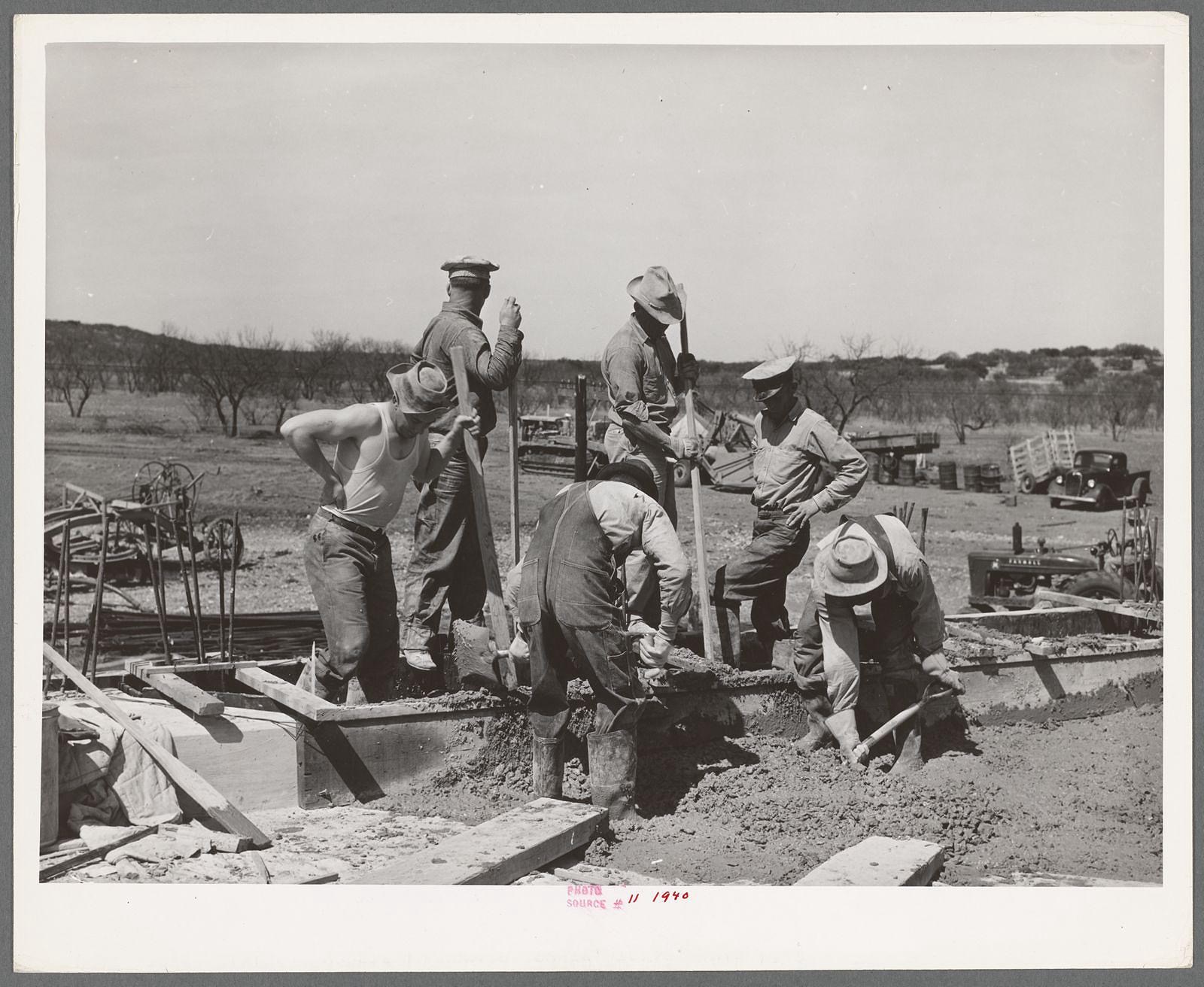
Russell Lee:
Road worker mixing concrete in Menard County, Texas (1940)
United States. Farm Security Administration
"I swear I'm just along for the ride."
Ten days later, we might have recovered our porch refurbishing project. A bungled footing pour had set the effort back by requiring some remedial reengineering and considerable additional digging. Four failed inspections, and the inspector still needed to clear for ThePour, which had sometimes seemed like a mythical, perhaps unattainable future objective. The morning of ThePour, we still had yet to receive the requisite permission. I stopped by the job site to chew Pablo, our concrete contractor, a "new one," telling him to stop fucking me and do his job. "We will pass this morning's inspection," I insisted more confidently than I should have. He started explaining to me that one footing might not yet have been dug deep enough, that he might have to jackhammer out the sidewalk and dig from the top down rather than from the side in. "Fine," I replied, "Whatever it takes."
I left it at that, leaving to take our GrandOther to school, promising to return in an hour.
ComingToFuckingJesus

Franz Stuck: The Guardian of Paradise (1889)
"I might convene my ComingToFuckingJesus Meeting,
but nobody even remotely resembling Jesus ever attends."
I am, by nature, a patient man. I am taken to making generous interpretations. I think of myself as forgiving to a fault. I travel without the burden of grudges. I have never been obsessed with the presence of even imagined enemies. I am, in short, usually happily oblivious. Go ahead, take mean advantage of me. I'm unlikely to seek redress in the thoroughly unlikely event that I notice. I am a well-known and long-standing schlemiel, born to be humiliated. But even I have my limit. I rarely experience it, but somebody will likely hear about it when it finally appears. I'm likely to convene what I call a ComeToFuckingJesus Meeting to air my ill feelings. I will expect contrition and compliance from the target of my considerable vehemence. I will come pissed and usually surprise myself with the swiftness of my truly terrible sword.
I am not now, if I ever was, a Christian.
Successable
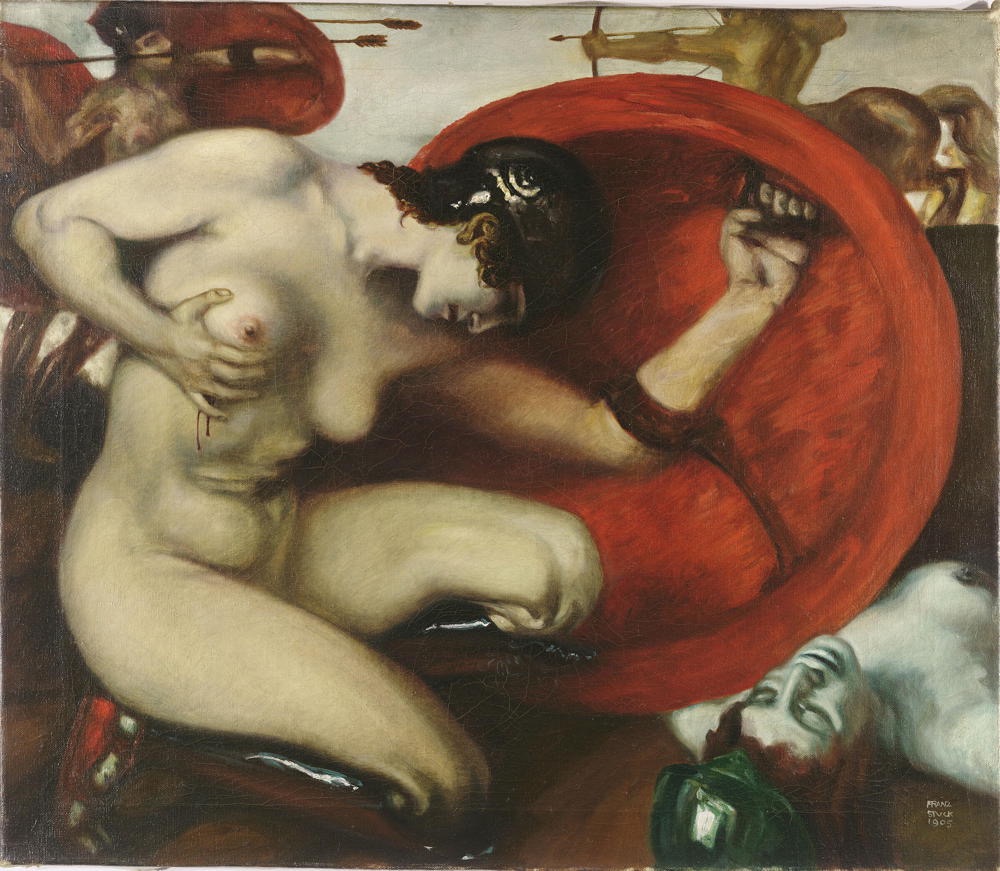
Franz von Stuck: Verwundete Amazone [Wounded Amazon] (1905)
" … if only we were clever enough to insist upon those more infinite terms of engagement."
Success has ten thousand identities, from the simplest-minded to the sublime. The simplest-minded achievements are those where some winner takes all, where a student earns straight As, and the quarterhorse takes the crown. The more nuanced successes are more common, ones where criteria seem ambiguous and some higher-order judgment appears to be required to even coherently aspire. A mentor of mine reminded me to begin every critique by appreciating that something even appeared on the page, for that alone might qualify as a miracle. Few experiences can be appropriately characterized as total losses; even last place still finishes a race. A firm belief in the possibility of absolute success was never required to enter a race. Once the odds turn against a competitor, it rarely makes much sense to insist upon belief in an unlikely ultimate victory. Choose your success criteria carefully.
It matters which game you're playing.
ReInspecting
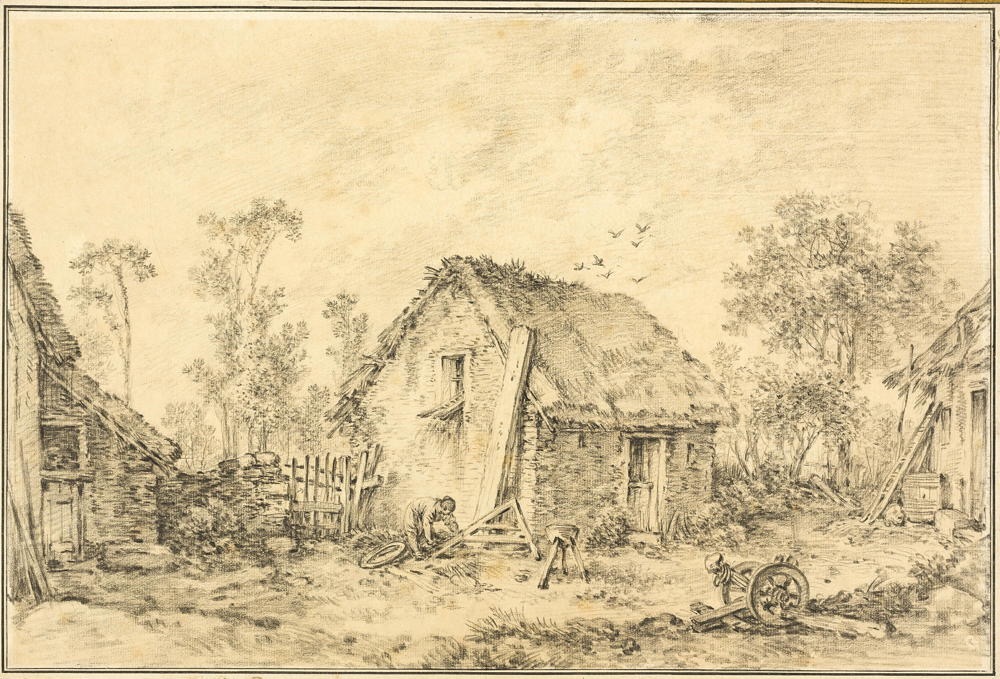
François Boucher:
Landscape with Rustic Cottage (c. 1760)
" … an essence of ProjectCommunity."
Failing that first inspection threw our porch remodeling project into some chaos. We started insisting upon dotting 'i's and crossing 't's, which affected momentum. Our concrete contractors found another project to entertain them while waiting for the city to mark where utility lines lay. A couple of days later, we decided that since they would be digging with shovels rather than backhoes, we would be unlikely to get into trouble if we just went ahead and started digging around the offending footings. You might remember that the inspector found the footings too shallow and that the engineer had prescribed simply digging deeper beneath the four load-bearing points along the footing. The crew quickly dug the prescribed depth and dimensions on three of the four load-bearing points. I ordered a second inspection before they'd finished the fourth point, which looked to be a more difficult dig. The inspector appeared at the appointed hour, though the contractors didn't.
It was clear that the work was not yet complete.
Reunion

Louis Monza: Corn Eaters Reunion (1940s)
"Life would be tragic if it weren't so goddamned beautiful sometimes!"
She insisted that she would not attend, that the experience would prove too painful to bear. She had helped organize the last reunion. She had participated but with a role to play, a role she could hide behind. She had been charged with taking pictures, and she'd successfully hidden behind her camera so she could witness without engaging. She felt too vulnerable and exposed this time, so she wouldn't go.
Then she told the most remarkable story.
ReckoningWith
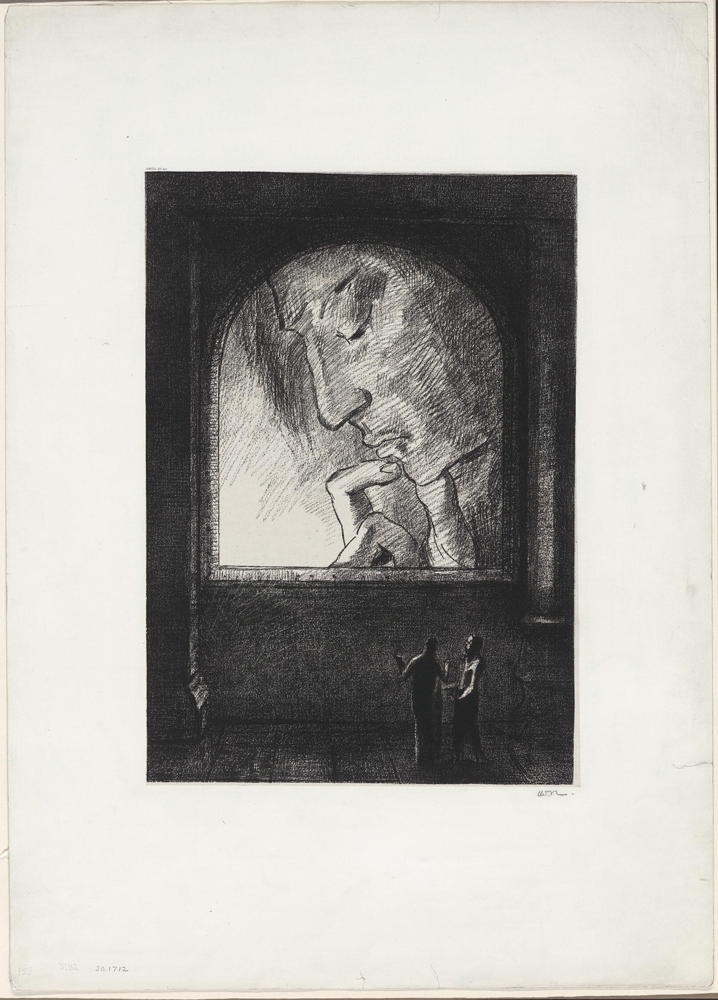
Odilon Redon: Light (1893)
Reckoning With
They insist that you are a force to be reckoned with,
but I perceive you’re much different.
While you undoubtedly are a force
that sometimes requires some Reckoning With,
this characterization misses more essential elements,
for you are, first and foremost, A Woman Of Substance,
not merely of force,
and any attempt to reduce your presence
to one of the baser elements misses points.
Weekly Writing Summary For The Week Ending 8/22/2024
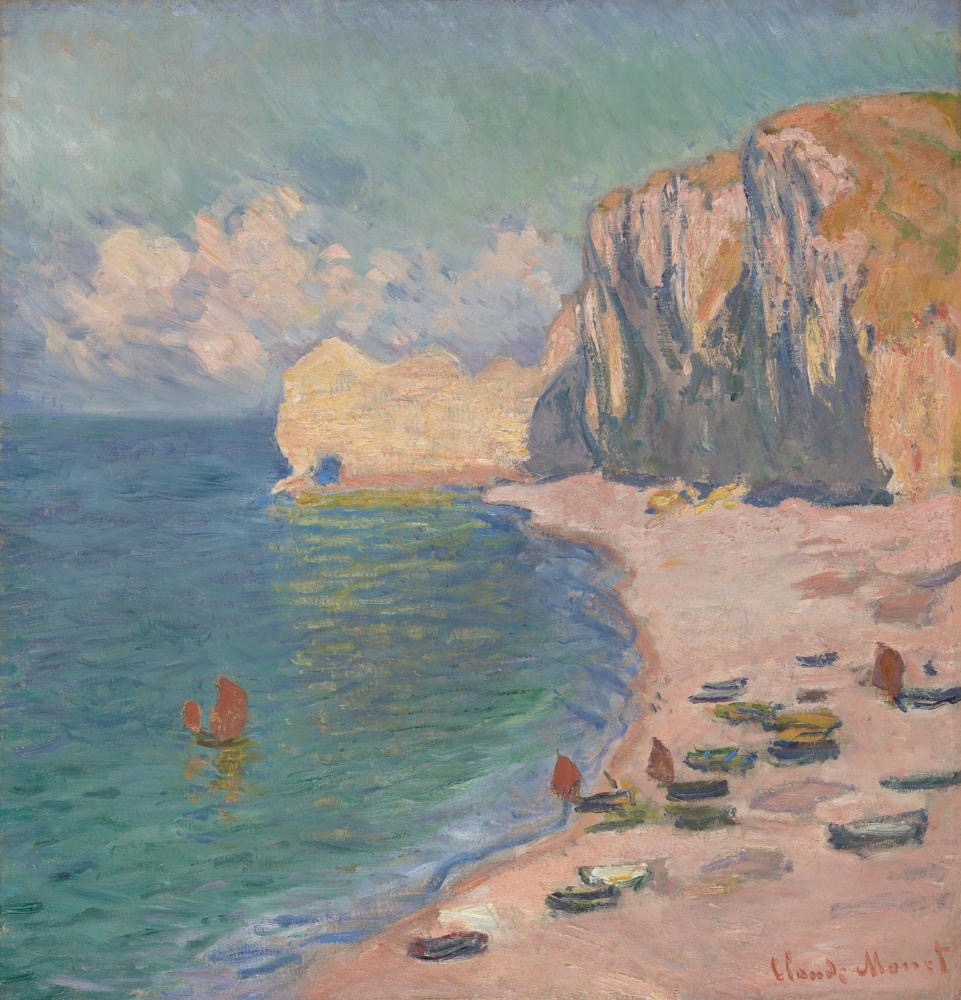
Claude Monet: Étretat: The Beach and the Falaise d’Amont (1885)
Nothing Else To Find
I might be the most fortunate SOB in this universe. Even so, not everything in my life goes according to plan. Heck, only some things I do seem necessarily planable, but I abide. I have been aging every inch of my way, though aging, being almost imperceptible from day to day, never seems prominent. I take stock each year as Summer starts waning and my birthday reappears. The Muse's birthday follows a few days later, and in the course of a week, we've successfully recalibrated. I nap more than I used to. I hesitate more before writing. When I started this writing streak seven years ago, I seemed fearless, though cluelessness more likely explains my behavior.
I worry whether my writing will prove up to standard, a standard I have yet to define or enforce. I do not want to live on purpose but on something more like an accident. I want what I create to remain mysterious, if not necessarily to my readers. I prefer to believe it's an expression more than a creation; creations need too much deliberation and design before beginning. I cannot command that I be spontaneous, for that command co-opts what spontaneity requires. I might live accidentally on purpose, the purpose an emergent property of engagement. It must not be all that important that I know beforehand what I'll create, but more necessary that I discover something I can relate to when creating or just after. I still do not know how to write, though I'm coming to understand when to write. I might have nothing else to find if I can muster the foolhardiness to write when it's time.
Flipped
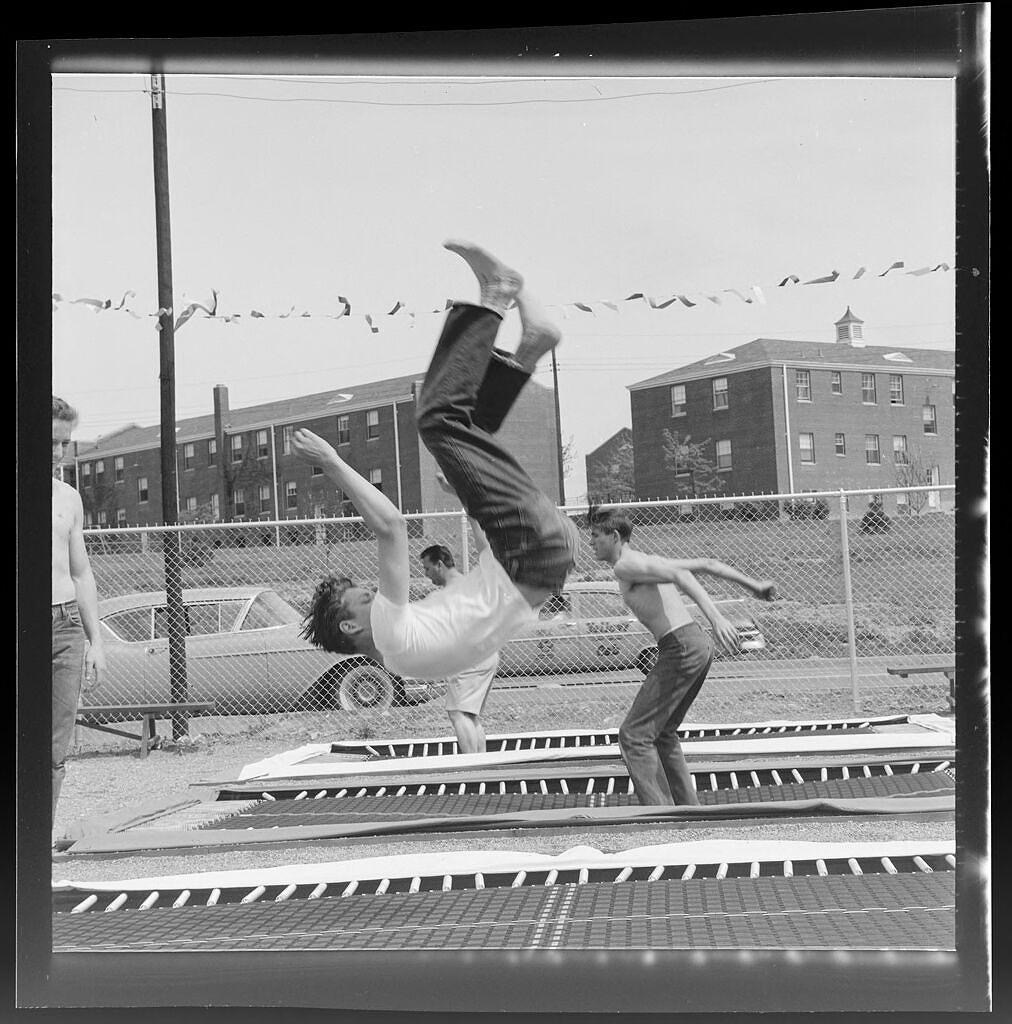
Jack Gould: Untitled [boy doing backflip on trampoline] (c. 1950)
"Weird seems to be the word of the moment."
Early yesterday morning or the morning before, I Googled "Jamie Raskin Speech At DNC" to find Representative Raskin's Banana Republican speech, which I'd seen mentioned in a New York Times piece. I'm a huge Raskin fan. We lived just around the corner from him when we were exiled to The People's Republic of Takoma Park in Maryland, and I appreciate his wisdom and wit. We also share the tragedy of losing a child filled with promise for our future. Having survived two bouts with Cancer, he seems exceptionally courageous and purposeful, the soul of effective opposition to the Banana Republicans. He also stood as a manager of the House's January 6 hearings. He chose the right side of history when making it. Google delivered the link, and I clicked on it, whereupon the Google Gods selected an appropriate advertisement as a preface, for, if anything, the algorithm is known for its prescient context sensitivity.
It served up one of those rambling, incoherent Trump ads featuring the chief Banana Republican failing to make either a case or a point.
GiftsDiffering
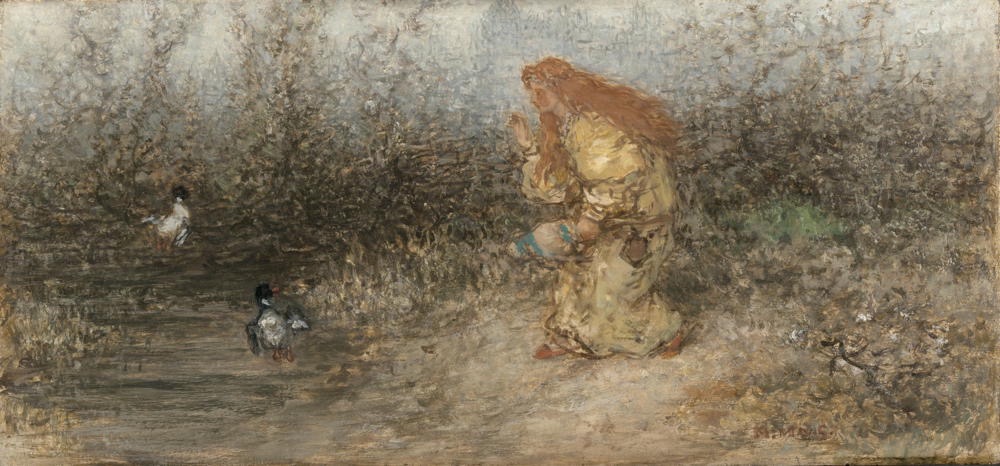
Matthijs Maris: Fairytale ( c. 1877)
" … surprise and perhaps even delight us in the end."
Gifts Differing: Understanding Personality Type, a 1980 book written by Isabel Briggs Myers, introduced me to the study of different gifts people bring to their lives and their work. Before I read this book, I naively presumed that my behavior represented normal responses while everyone else's was some variant of weird. I was not wrong in these early assessments; I was just a little incomplete, for coming to know my perspective just began my understanding. My perspective remains my base understanding, for how could it be otherwise? I have never experienced anything from another's perspective, and nobody else has ever shared mine. I remain unique but not necessarily typical, just like everybody. We remain steadfastly different but not unclassifiable. We each tend toward some common differences; those of us more comfortable with introverting are often more alike than we seem when compared with those preferring extroversion. If one does not get too awfully tangled up in their perspective, one might come to perceive others simply being themselves: perhaps weird but not necessarily wrong: different.
The few people populating our porch refurbishment project couldn't be more different.
Sacraments

Carla Liss, Designed by George Maciunas,
Published by Fluxus: Sacrament Fluxkit (early 1970s)
" … enough to fully satisfy our legacy …"
On my birthday or thereabouts, The Muse and I escape whatever life we're living to engage in an annual ritual as sacred as Christmas. We flee to the edge of the backcountry, on the border of the Winaha/Tucannon Wilderness, to partake of an indigenous fruit, the Winaha Currant. We accidentally discovered them decades ago when on an otherwise routine mountain toodle. We found bushes leaden with clusters of lush black fruit emitting an overwhelmingly alluring scent and tasting quite extraordinary. We hesitantly waded into the adjacent chilling stream and commenced to harvest the fruit, punctuating our work with greedy, lip-staining nibbles of our prey. We returned that first day with a couple of plastic bags of fruit, enough to produce some reduction for use in the kitchen: an unusual drizzle over meat or dessert: Sweet but perfumy, Savory, and absolutely unique. These were not quite the generic black currents popular throughout Europe but a New World variant as unique as our region.
We found that first foray into Current-gathering more than refreshing.
Redemption

John Singer Sargent: Death and Victory (1922)
" … the forgivable sin of project work."
Last week ended in deep disappointment. The porch refurbishment project had become an embarrassment. I sent the concrete crew home or off to another job pending a reply from the consulting engineer. I remember cursing the stipulation that this job needed an engineering report, clear evidence of needless regulation, and another thousand dollars spent to dubious effect. I'm learning that every resource this effort has attracted has been a critical puzzle piece, their importance sometimes puzzling until some moment of extremes. We'd failed our inspection—well, actually, the footing poured by Pablo, the concrete contractor, and his crew had fallen short of expectations. It's interesting how I included myself when ascribing guilt. I wanted no blaming or finger-pointing. We were either laboring in concert or wasting our time, so I owned my part in the disaster. We might have avoided the failed inspection if I had been more attentive and insistent. We failed it, as we also failed ourselves.
The inspector insisted that he would approve any plan approved by the consulting engineer if it was executed according to plan.
MovingOut/In/Up/On
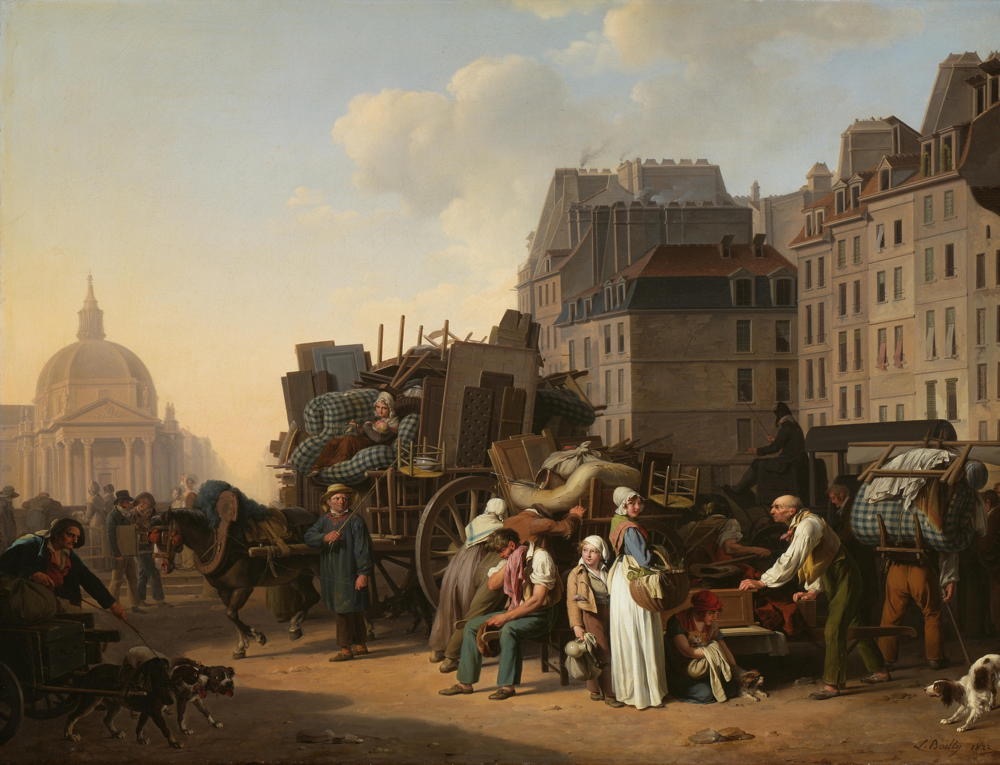
Louis Léopold Boilly: The Movings (1822)
" … every damned one of those takes considerable getting used to."
Of all human activities, Moving might be the most illuminating. When Moving, one becomes perhaps both their most vulnerable and their most liberated. Displaced, even temporarily, reveals many hidden edges and allows for much discovery, especially the sort one had sincerely hoped to avoid. Pull a dresser away from a wall and find the remnants of some earlier inattention, like a pair of cobweb-covered underwear. Idealy, Moving should only be attempted in private, but some possessions, like the infamous hide-a-bed, require at least a crew of two to move and, even then, will insist upon opening up when halfway up the stairs. The first and last scenes in many popular stories involve Moving, with the hero leaving on their defining journey and then returning to move on into another realm. There never seems to be any actual coming home, only MovingOut/In/Up/On.
I've been blessed with the opportunity to assist my son Wilder in his latest MovingOut/In/Up/On.
BackAlmostToGo
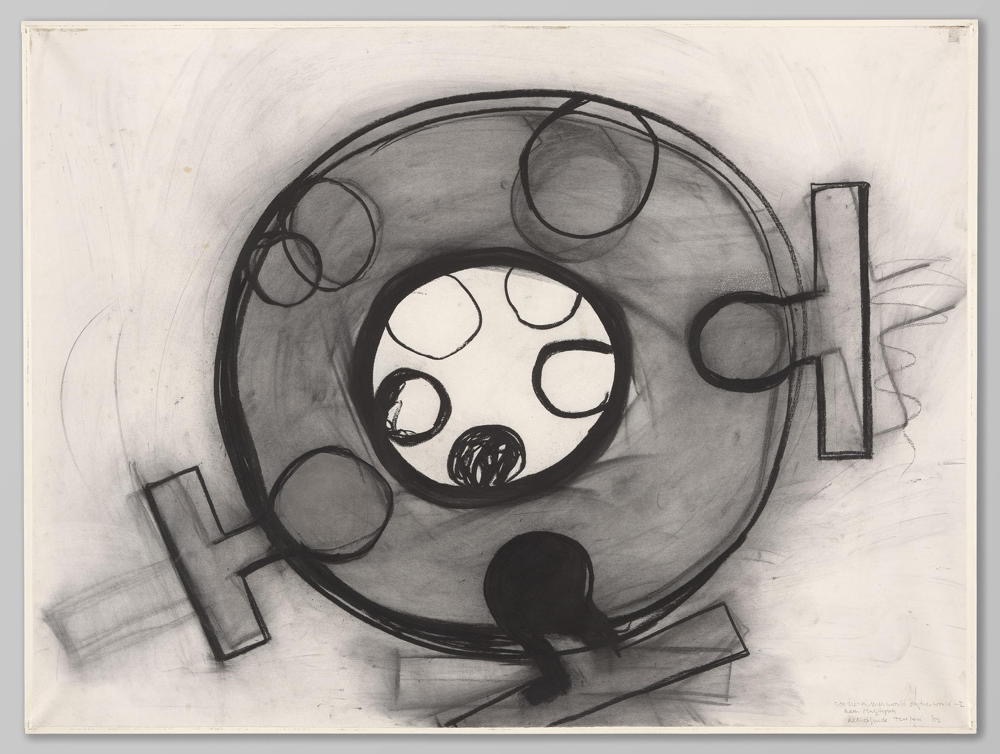
Kees de Goede: Studie Innerworld Outerworld I/, Naar Mug Stegner
[Study Innerworld Outerworld I/, To Mug Stegner] (1987)
" … I'll be faunching to get moving again."
A certain cadence profoundly influences every activity on this planet, or seems to. Time, as some wag noted, prevents everything from happening at once, but little prevents anyone from occasionally getting far ahead of themselves. This usually happens for all the proper reasons, with good intentions often contributing more than their fair share. Whatever the cause, the effect, if not permanent, does tend to be relatively immediate. A brick wall steps sideways into traffic. An unanticipated force field steals momentum. We get directed to head BackAlmostToGo without collecting our two hundred dollars. We seem incapable of seeing these experiences coming, even though they most often occur like a proverbial slow-moving train. After, we complain about how our senses must have left us behind, about how we must have become temporarily blinded. We're wary for a while after, sensing that our senses hide something essential from us. Our senses were never not withholding much of our experience from us. We register only tiny fractions of the perturbations around us, and we ignore many of those we experience as trivial or unimportant. Importance comes later if, indeed, it ever comes at all.
My latest fall came with the first inspection, a visit The Muse and I invited when it really should have been the contractor inviting.
Weekly Writing Summary For The Week Ending 8/15/2024
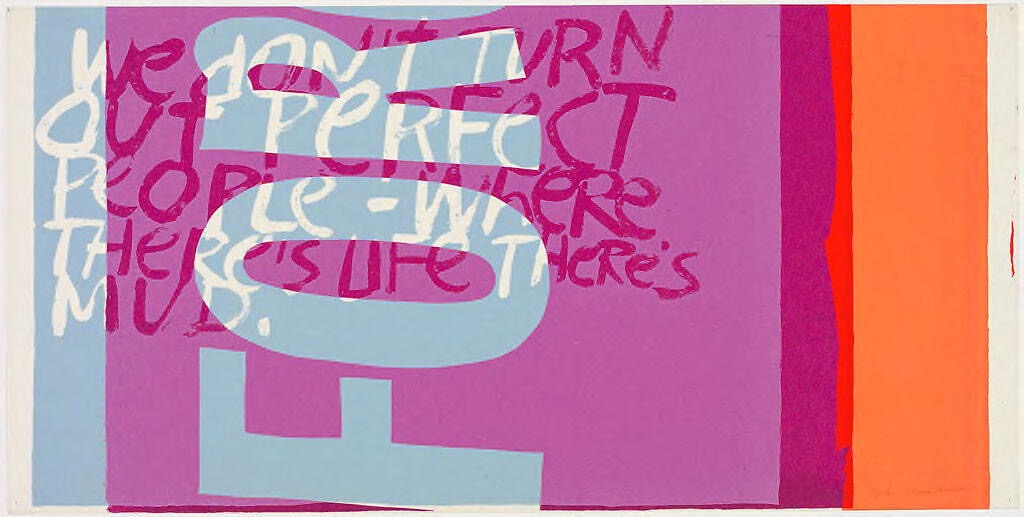
Corita Kent (Sister Mary Corita):
where there's life there's mud (1966)
Printed text reads: FOR[GET IT] /
we don't turn out perfect people
- where there's life there's mud.
Harvard Art Museums/Fogg Museum,
Margaret Fisher Fund
Copyright © Courtesy of the Corita Art Center,
Immaculate Heart Community, Los Angeles /
Artists Rights Society (ARS), New York
Once Upon A Time Aspired
As an acknowledged expert at project work, I would be remiss if I considered this designation to be an inoculation against experiencing any of what projects routinely serve their sponsor. One cannot avoid the inevitable, though one may, if remarkably clever, come to understand that inevitables say nothing about anyone's mastery or understanding. Acknowledged masters managed some of the most significant failures in the history of projects, and most of them eventually became godsends once the people involved accepted that they never were nor could have been in charge. Grace often arrives in sackcloth and shame, only to later tame discouragement. I cannot count the number of blessings I've experienced that were clearly curses when they arrived. It took time and patience for the universe to align around how the grand plan actually turned out. Nobody's very well positioned for determining success or failure as long as either metric seems to matter. Later, often much later, the blessing slips out from behind her disguise, and Grace sets down to have a spot of supper with you. Not one of us are masters, and none have an ounce of worthwhile advice between us. We're all still subject to the capricious winds and capacious disappointments. Not one of us was ever perfect, though several of us once upon a time aspired to become so. "Where there's life there's mud!" Sister Maria Corita
GoldenRules
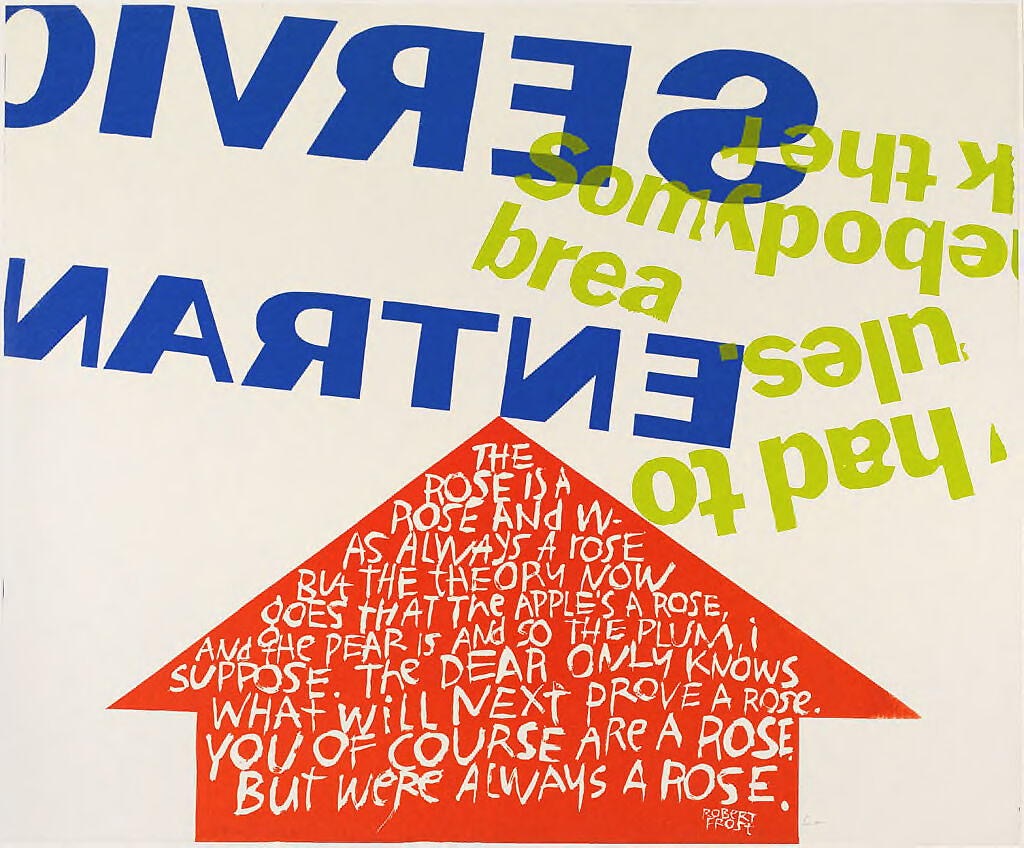
Corita Kent (Sister Mary Corita):
somebody had to break the rules (1967)
Screen print
The printed text reads: SERVIC[E] ENTRAN[CE] / somebody had to break the rules / The rose is a rose and was always a rose but the theory now goes that apple's a rose, and the pear is and so the plum, i suppose. The dear only knows what will next prove a rose. You of course are a rose. But were always a rose. Robert Frost
Credit Line: Harvard Art Museums/Fogg Museum, Margaret Fisher Fund
Copyright © Courtesy of the Corita Art Center, Immaculate Heart Community, Los Angeles / Artists Rights Society (ARS), New York
"I wonder every morning how I should live."
The question remains open regardless of how often it's answered: How should I live? It might be better understood to wonder, 'How should I live now?' because, with shifting contexts and ever-accumulating experiences, one's response might reasonably change over time. The aspiration to answer this question once and for all might be universal, for it's as inherently unsettling of a question as it is also apparently definitively unanswerable. I have caught myself getting glib in the face of it, resorting to some Hallmark® Card homily as if that might dispatch the troubling issue. I try to do unto others as I'd prefer them to do unto me, The Golden Rule, even though I know not everyone might appreciate what I’d warmly receive. I considered The Platinum Rule an improvement—to do unto others what they want to have done unto them—until I realized that I rarely have access to what others want to have done unto them. I'm not omniscient. Further, even if I knew focusing on their bare want could quickly get me into trouble or violate my own better intentions. I wouldn't want to supply drugs to a person with an addiction to satisfy some Platinum Rule.
The forms of these rules never change.
Inspecting
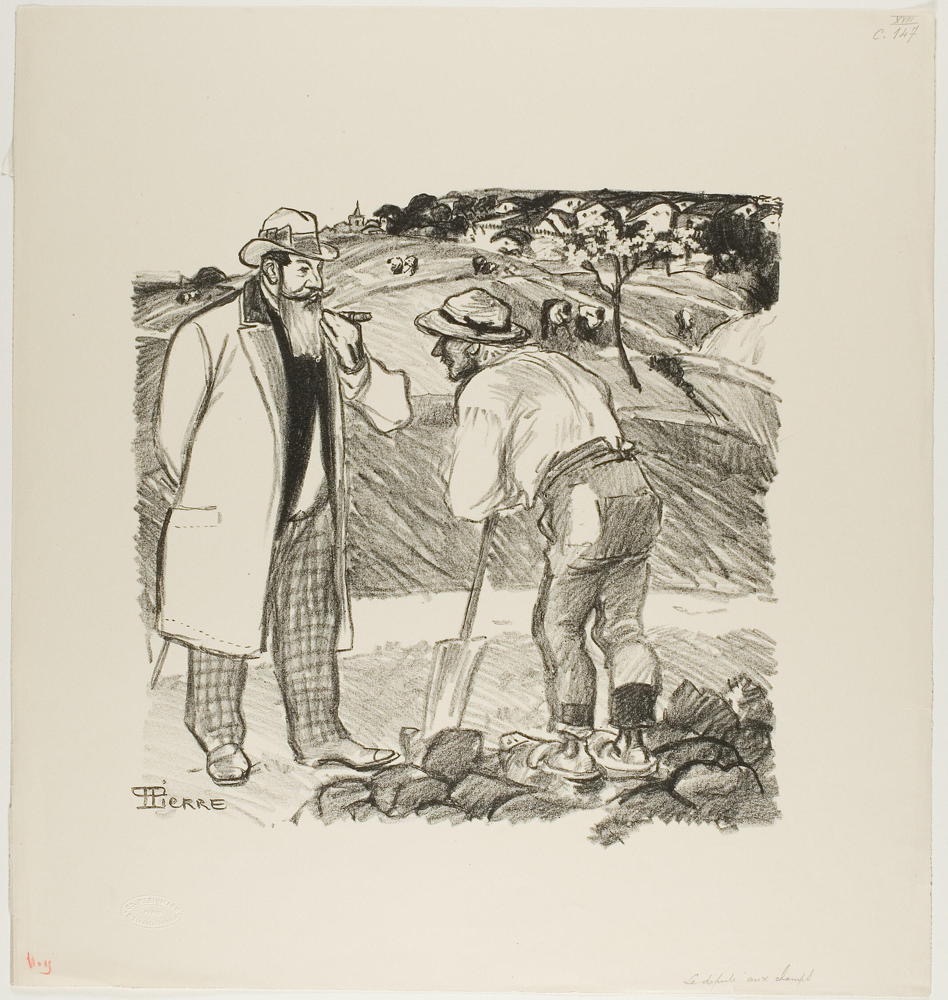
Théophile-Alexandre Steinlen:
The Field Inspector (April 1894)
"Placating paves more streets than protesting ever did."
When we finally collected the permit required to start our porch project, after nearly two long years of failing to satisfy its requirements, I asked about inspections because I didn't know the rules. The permit person said our contractor would know when to call for inspections, so I set that issue aside as beyond my purview. I had not thought another second about Inspecting until late yesterday afternoon when Joel, our carpenter, dropped by to survey progress. The footing had been poured that afternoon, and all seemed right with the world. Joel asked if the inspector had visited yet. He hadn't, as far as I knew, but I had not been trying to stay in the know on that issue. Joel went on to say that said inspector might insist that we encase the porch deck supports in concrete, too, and that he usually wants to see the rebar inside a form before concrete's poured. However, he often happily assumes the work was done properly if he knows the contractor. The footing concrete has already been poured. He could insist, if he wanted to be a real son-of-a-bitch, that we remove the newly poured footing to confirm it has the required rebar embedded in it.
This practice should be confusing because I'm not now and have never even aspired to become a member of the contractor society that lives and dies by the judgments and rulings of city inspectors.
Designering
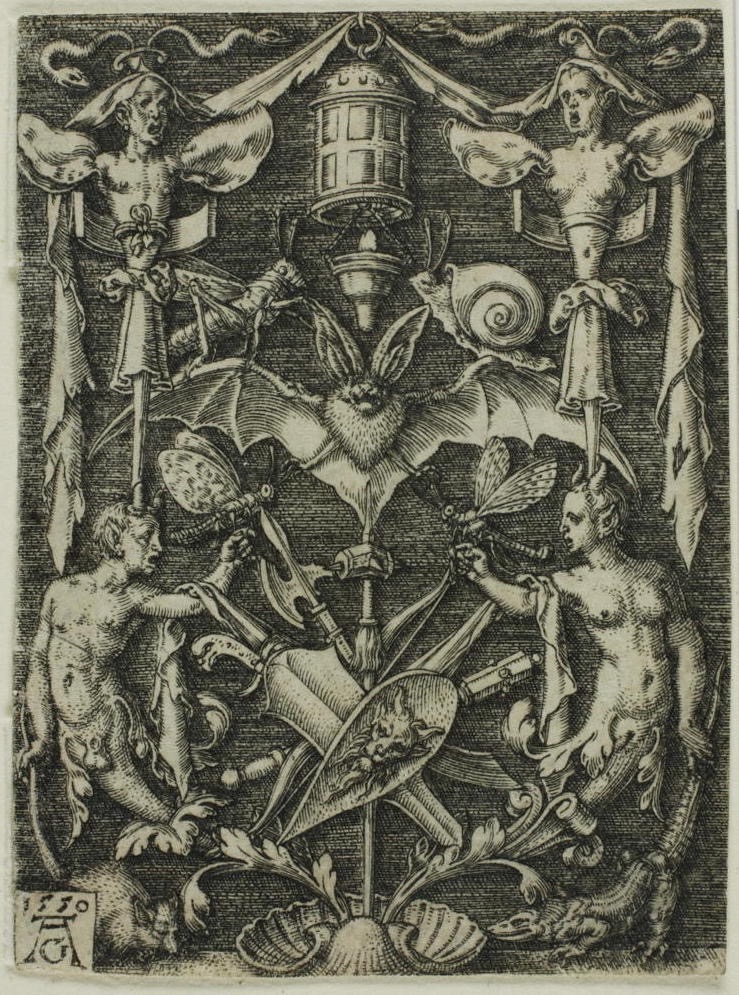
Heinrich Aldegrever:
Ornamental Design with a Bat in the Centre (1550)
"We approximately understand what we're doing …"
Design, like almost everything, seems different in theory than it does in practice. In theory, Design must be complete before construction begins. Practice finds considerable overlap. We might diligently try to fully flesh out aspirations beforehand, but our context shifts once we start moving dirt. We often cannot foresee what will become evident after we've exposed rafters and taken down walls. More than fine-tuning occurs regardless of how complete the design seemed during preliminary discussions. The contractor holds more responsibility than they'd ever willingly contract to deliver and always have. They're most likely to notice the small incongruences that could explode into disaster. They're the ones present to see the plan's emerging incompleteness. They're the ones tacitly charged with continually asking the most uncomfortable questions.
Spontaneously mustered conferences are called. Jesse, the structural guy who will perform the follow-on effort, held clues for the foundation builders and vice-versa.
LevelSetting

Alfred Stieglitz:
Georgia O’Keeffe—Hands and Thimble (1919)
"I'll insist on seeing level even if some crookedness persists …"
On the third day, brick removed, the concrete contractors started pulling string and finding plumb. I asked Pablo if he was doing that, and when he confirmed, I cautioned him that many had sought level and plumb in the old house, but they had yet to find it. He insisted that he would persist and lay a footing upon which a level and plumb front porch would permanently rest. The Muse and I left town for the weekend while his crew prepared to quit by noon that Friday. I'm watering around the works this morning, waiting for the crew to arrive to start fitting rebar into the space. Tomorrow, I expect some concrete will be delivered, and the permanent part of the effort will commence on just the fifth day of work.
Pablo moves sure and fast.
FuturesPassing
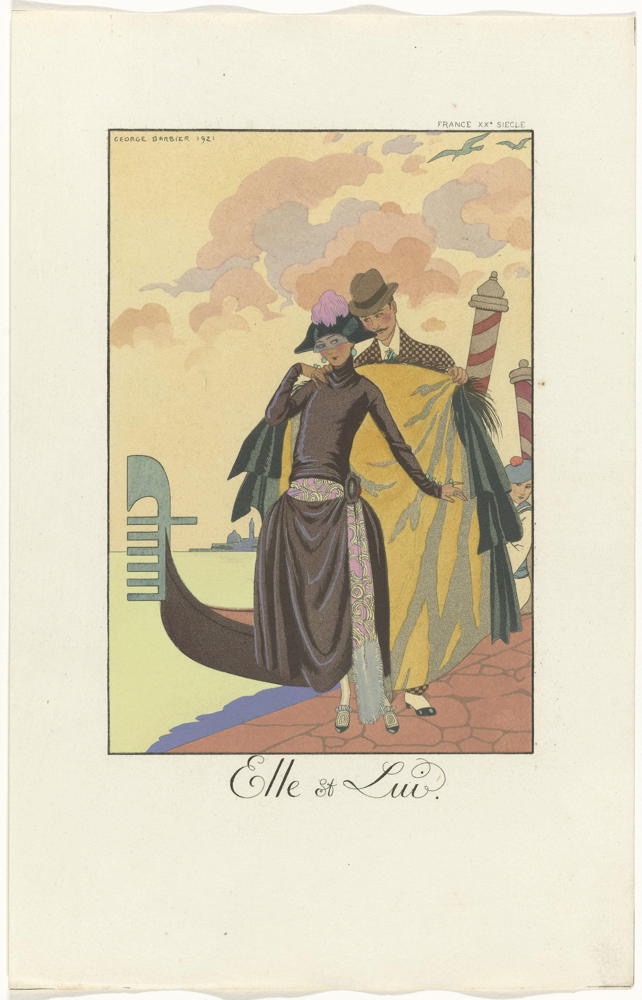
George Barbier: Falbalas et Fanfreluches: almanach des modes présentes, passées & futures pour 1922: Elle et Lui / France XXe siècle, [Falbalas and Fanfreluches: almanac of present, past & future fashions for 1922: She and Him / France 20th century,], (1922)
"The future doesn't hold a place for any us, thank heavens."
To a man my age, a trip anywhere becomes a trip into an unwanted future. I might depart aspiring to visit my past but inevitably return having glimpsed a dreaded next. It will likely become much worse than I imagine, but the hints I do glimpse leave me stunned. There was a day when the future seemed promising. Midcentury America featured posters promising flying cars and what now appear to have been early precursors to Spandex®. The flying car notion fell apart when encountering human potential. Had we understood the cost of combustion engine propulsion, we might have retained our attraction to wagons and horses. Still, we were smothering ourselves in horseshit then, and the invisible pollution from the combustion engine seemed a vast improvement. Maybe it was.
I had warmly anticipated a visit to Norstrom's flagship store, remembering when Nordstrom really knew how to run a flagship store.
Aches&Complaints
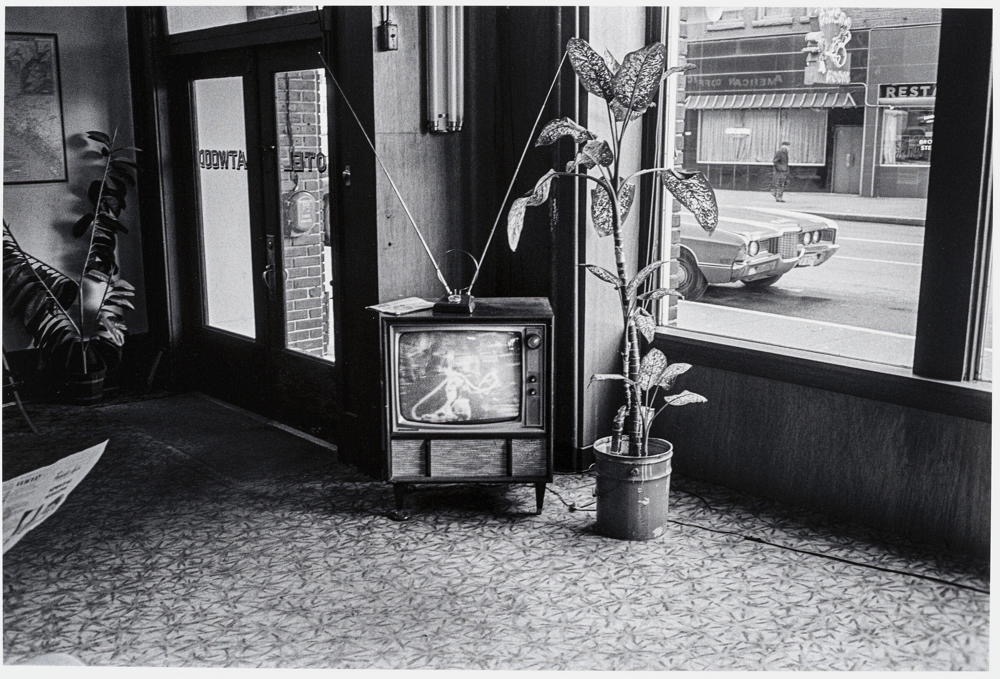
Dennis Feldman: TV and plant in hotel lobby – Seattle, WA – 1974 (1974)
"Sleazeattle embodies the sin of self-importance."
Driving into Seattle from the east on I-90, I was reminded of the many times I'd hitched along that road fifty and then some years ago. I much preferred to hitchhike that route, and as I drive now, I reflect backward on that time and place that no longer exists. Sleazeattle seems all but indistinguishable from the place I knew then. The street names remain unchanged, but everything else has become some post-modern approximation of the authentic article. I explained to The Muse that back then, there was no tunnel on the western side of the Lake Washington Floating Bridge. The freeway emptied onto surface streets that were never not tangled with traffic. We somehow slip through the newer approach and slide the two exits north on I-5 without difficulty, even though it's after five on a Friday. As usual, we must circle a few blocks to get The Schooner properly oriented to the hotel's loading zone. We checked in quickly, and I slipped across the street to park the car in the lot next to the Korean restaurant. Welcome to Belltown again.
We're doing a Jazz Alley show and dress for the occasion.
Weekly Writing Summary For The Week Ending 8/08/2024
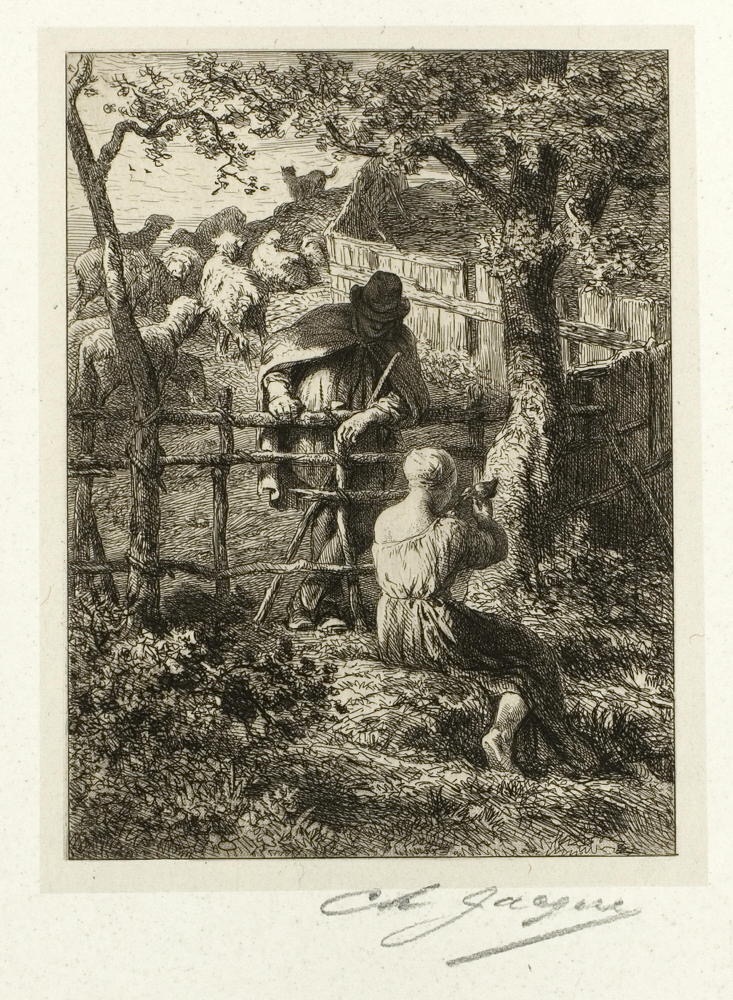
Charles Émile Jacque: Summer (1885)
Committing Sins and Seeking Penance
A spare year ago, I first experienced what my internist would later label Bursitis, a mysterious and painful inflammation in something I'd been blissfully ignorant I even had. It seemed like a made-up disorder, even though it kept me from finishing a painting project. I felt I needed that project as repayment of a debt I'd incurred when first refinishing that surface. I had penance to pay, but the Bursitis prevented my repayment. I hired a painter and nursed my shoulder, feeling decrepit. A year later, I'm still learning how to integrate my now definitely more tender shoulder into my existence. I'm learning that if I don't challenge The Bastard Bursitis, it tends to win. When I buck up and engage with it anyway, whatever discomfort I initially feel quickly disappears. The harder I work it, the more it seems to reward me by forgetting to punish me for my indiscretion. This story perfectly fits my predilection. I want to believe that personal gumption overcomes physical affliction, even though I know that notion to be essentially fiction and dangerous. I live an elaborate fiction, growing ever richer with each fresh experience. One day, the sum of my continuing indiscretions will probably catch up to me. Until then, I'll continue committing sins and seeking penance.
QuickStart

Unknown English Artist: Linen, plain weave;
embroidered with wool and silk in tent stitches:
Harvesting (1701/25)
"What began as endless frustration …"
Two days following the FirstMeeting, the porch renovation project enjoyed a QuickStart. By eight-thirty, deck boards were being pried up. By noon, ceiling props were already being placed, and the brick planter wall was demolished. By the end of that first day of actual work, the ceiling had been thoroughly propped, and part of the brick perimeter had already been toppled. I constructed a peanut gallery comprised of a vintage metal lawn chair and a garden bench where Kurt, Our Painter, and I sat through the early afternoon making observations as the crew did what crews have always done. We considered it a credit to Pablo, The Concrete Contractor, that the crew seemed light-hearted, joking good-naturedly while they worked. Pablo occasionally called me over to point out some fresh absurdity in the construction he and his crew were dismantling. One only knows once deconstructing just how flimsy the prior renovation had been, though we had always suspected.
We decided that the brick front had indeed been cosmetic because the columns didn't extend down to the ground.
Denialing
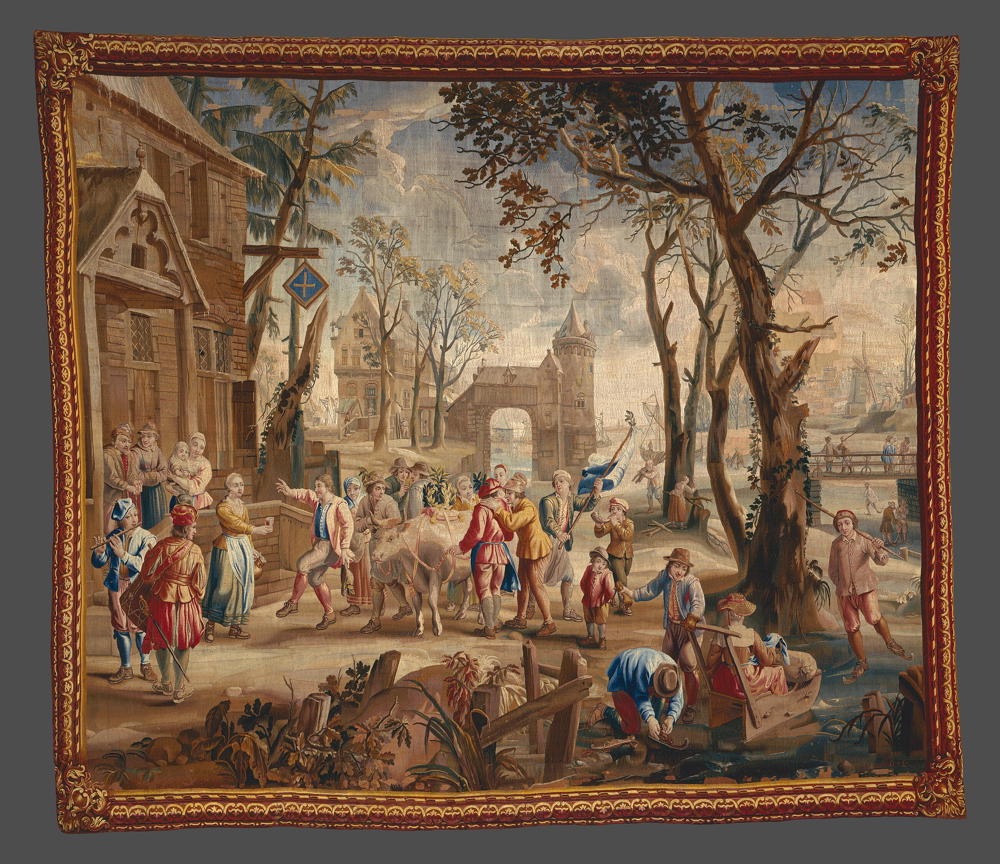
After a design by Jan van Orley
Woven at the workshop of Daniel IV Leyniers:
Procession of the Fat Ox from a Teniers Series (c. 1725)
Denial remains the first stage of acceptance.
"This process should be upsetting."
The true purpose of that First Meeting wasn't satisfied until a second meeting took place. The concrete contractor, the lead player in this production, couldn't make the initial meeting, so we convened a supplemental session for those who couldn't make the first. Pablo, the concrete contractor, and his assistant Wilbur asked harder questions. The conversation began light-heartedly enough but quickly degraded into difficulties, which was precisely its purpose. We tend to start projects filled with promise. We neglect to recognize what must be sacrificed to achieve that promise, and it always comes as a profound surprise when the first hints of underlying costs surface. I began my contribution by suggesting we could support the roof from the top of the deck. I even took Pablo to the basement access panel to survey the underlying infrastructure. He seemed to become thoughtful as I sold my proposal. Once we returned to the front porch, to the top of the deck, Pablo asked the Golden Question.
We had been seeking problems rather than solutions.
FirstMeeting
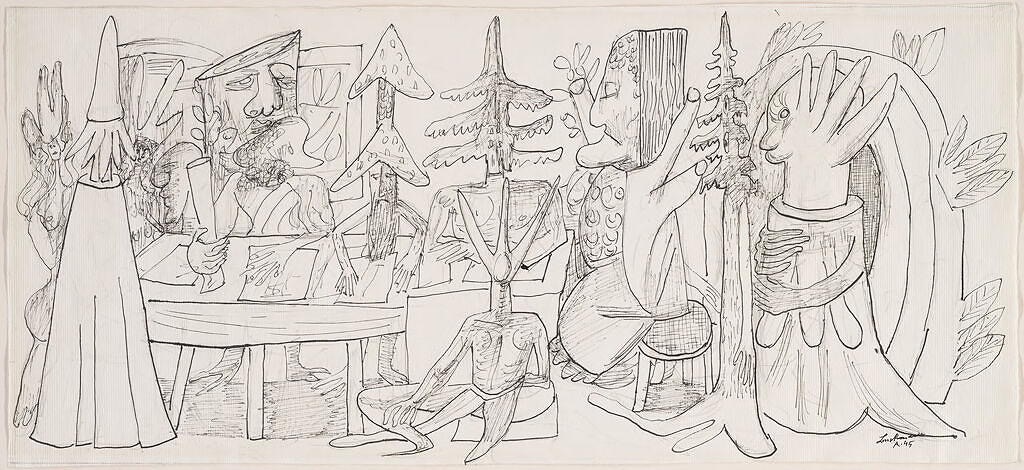
Max Beckmann: Meeting of the Forest Owners (1945)
"Now I understand how I will get to trust him."
The FirstMeeting on any project becomes a defining moment, for this gathering always occurs unselfconsciously. The attendees have yet to fall into whatever identities close association always encourages. They're as close to their shoes-off-selves as they'll ever be, if only because nobody quite knows who they're supposed to be yet. Yes, some will show up intending to show well. Others will come inquisitive, but each will come wrapped in an innocence they will quickly abandon in favor of forward momentum. In this session, patterns will make their first appearance. The group's DNA will be present but not yet fully evident, disclosing only hints. Attendance alone will communicate something, for not everyone will make the meeting. Each explanation should say something about who they might become once they join this ensemble. I try to maintain my attention.
The concrete contractor, by far the most crucial player in the early part of this effort, had his sister, who answers his phone, call fifteen minutes before the scheduled start to explain that he'd had a mechanical failure during a pour and couldn't get away from his current job site for the meeting.
Mustering
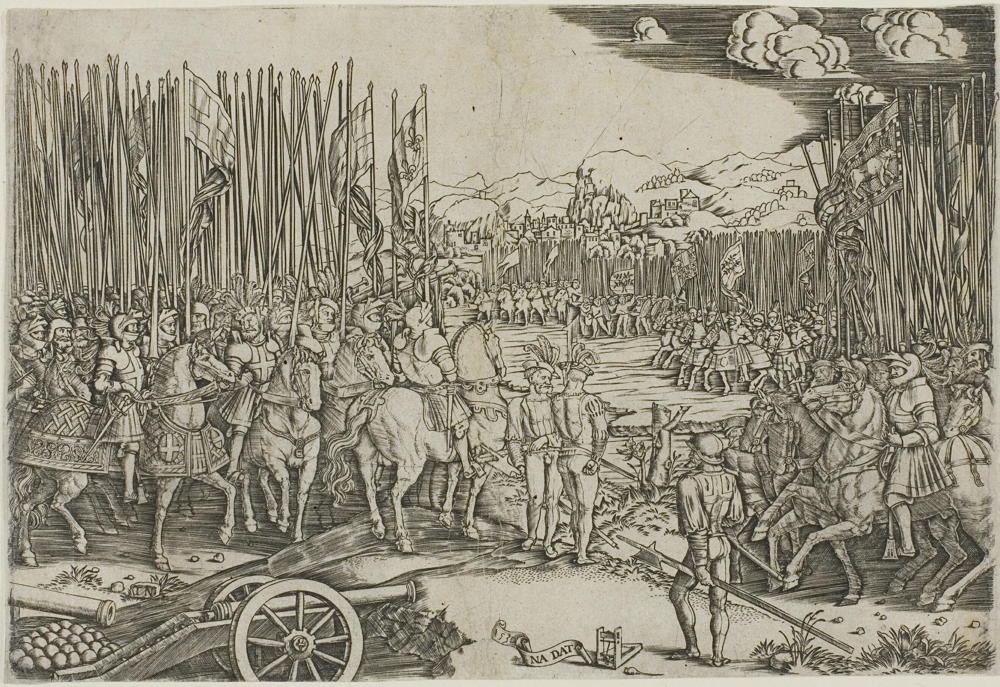
Master with the Mousetrap: The Two Armies at the Battle of Ravenna, 1512 (c. 1512, printed 1530)
" … we're rapidly closing that overlong-open window."
The scheming part's over now. We're finally Mustering the forces necessary to affect the changes to the front porch The Muse mandated two summers ago. The project hadn't started, couldn't have started, until after the permit was approved. Before then, we were scheming, projecting, and assessing. Permit approval made this project inevitable and, finally, surprisingly, real. Before, it was theory; now it begins to become practice. Very little's settled yet. We've painted only in the broadest strokes. We've spoken as if we knew even though we couldn't have possibly known. We wanted estimates for an effort nobody could imagine. Once the principals converge to imagine together, we will begin the real work of assessing actual effort and focusing forces. So far, I've given notice that we have approved permits, doubtless a huge and important milestone even though we really haven't started anything yet.
The first presumption of many to die in this effort was the notion that we might keep the mess from intruding into our lives.
HeatExhaustion
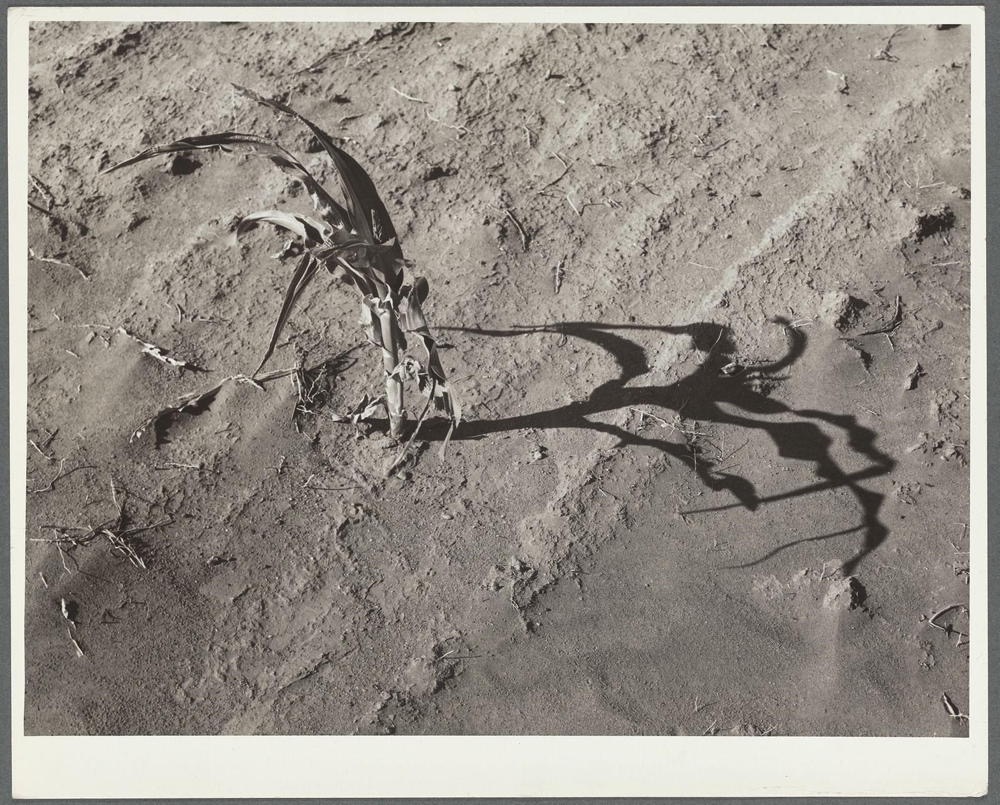
Arthur Rothstein: Corn withered by the heat and chewed by grasshoppers. Terry, Montana (1936)
" … Grace even within this seeming wasteland."
By August, the surface of this valley becomes burnished buff beige. The days start growing noticeably shorter, though they each nonetheless seem endless. On nights when the outside temperature can't even fall below seventy, The Muse opens up the house before she slips into bed when it's still hotter than eighty outside. I wake from fitful sleep to flip my sweaty pillow before finally surrendering to wee-hour wakefulness again. Nights seem no less interminable than days. The cats don't even bother to come inside those nights. They return listless in the morning to leave half their breakfasts uneaten. They hug cool pavement or find a soggy corner of the lawn to lounge on. I envy their soggy corner.
Our basement provides the only respite.
BustinLoose
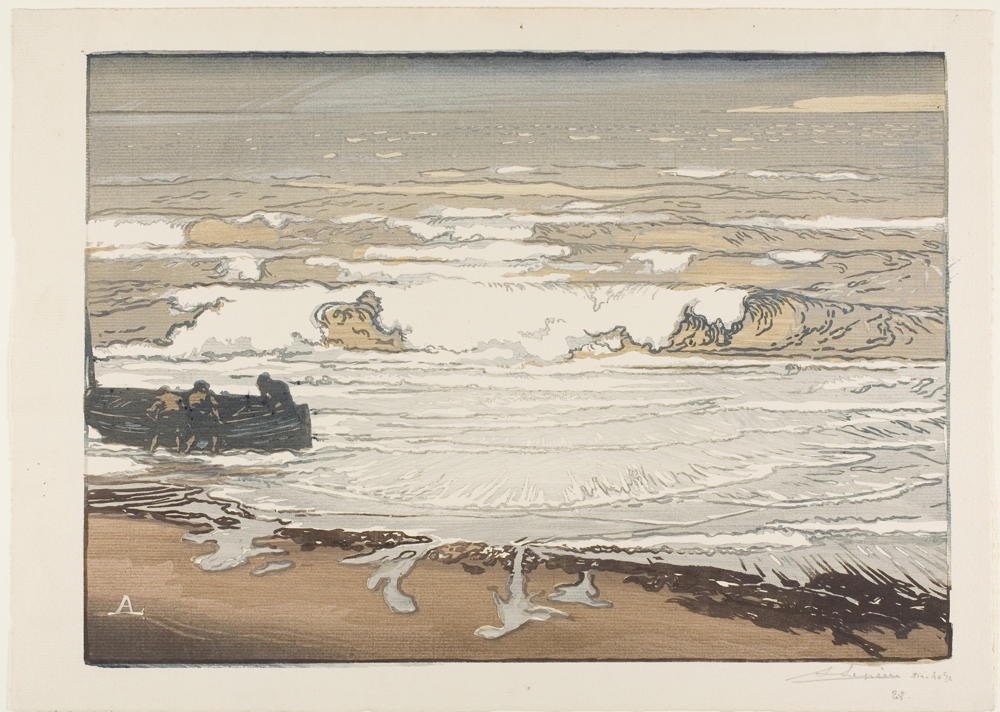
Louis Auguste Lepère: Breaking Waves, September Tide (1901)
" … just gravity or something similar having her way with us again."
If I am to take away any notion from this discontented summer, let it be the conviction that things seem like they will never be any different until a slight difference appears one day; then, things can never be the same again. This abrupt nature of change belies the idea that it might occur gradually, according to the Boiled Frog Theory. However, even in the Boiled Frog Theory, the frog has no sensation of boiling until it is too far gone to be rescued. He, too, senses no change until it "suddenly" becomes inexorable. Then, that familiar lifestyle's already over, never to return. This seems the truer nature of life, of living. We might be forever changing, but we only sense we're changing on relatively rare occasions after it's already inexorable. This is another face of Grace.
Those who claim to be masters of change are probably lying to themselves.
Weekly Writing Summary For The Week Ending 8/01/2024
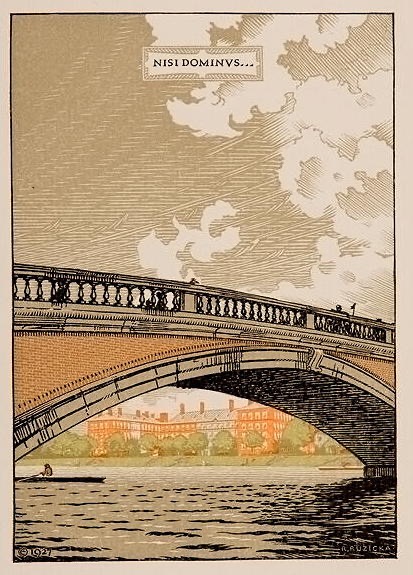
Rudolph Ruzicka:
Weeks Memorial Bridge, Cambridge, Massachusetts
(1927)
Unchangeable Until It Isn't
I have been quietly and happily dispatching long procrastinated chores this summer. Such efforts only commence after I've reached a certain level of self-loathing. I can shove stuff to the back of the closet for only so long, and it's over once I cross that border. I'm not reforming then, not repenting, just entering a later stage of the same form I had been inhabiting. It's a magical time, though. As I convey each clog, another appears, and each seems less daunting to dispatch. I gained a growing sense of personal authority as if I were discovering long-lost superpowers. Those powers were never lost but merely waiting for conducive conditions to arise. This summer of my discontent presents those conducive conditions, like late summer, which presents differing conditions from seemingly endless same-old, same-old days. I might never understand how change arises from sameness, but I can nonetheless depend upon its eventual emergence. Nothing can never be quite the same again, or really even for a first time. It's all different except my discernment, which seems unchangeable until it isn't.
Doubt

Wouter Pietersz II Crabeth: The Incredulity of St Thomas (c. 1626-30)
"I might conclude that confidence isn't required …"
I pity all True Believers, for they cannot experience incredulity, and without that small skill, they become a shill for every come-on and con artist they encounter. The True Believer insists that their faith sustains them while it nibbles away at whatever originally made them human. Only machines seem capable of unambiguous engagement; every other entity reserves something to preserve itself in case it makes an incorrect assessment. We gingerly place a toe in the water before jumping in. We likewise invest as if we could lose everything rather than as if we were sure from the outset to win. Caution trumps certainty—Doubt conditions belief.
My mother ended every phone call I ever had with her by saying, "Well, I don't know much."


